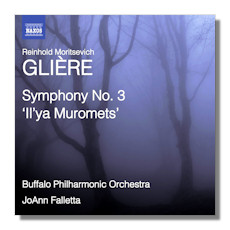
The Internet's Premier Classical Music Source
Related Links
- Glière Reviews
- Latest Reviews
- More Reviews
-
By Composer
-
Collections
DVD & Blu-ray
Books
Concert Reviews
Articles/Interviews
Software
Audio
Search Amazon
Recommended Links
Site News
 CD Review
CD Review
Reinhold Glière

Symphony #3 "Ilya Muromets", Op. 42 (1911)
Buffalo Philharmonic Orchestra/JoAnn Falletta
Naxos 8.573161 71:37
Also available on Blu-ray Pure Audio NBD0041:
Amazon
- UK
- Germany
- Canada
- France
- Japan
- ArkivMusic
- JPC
There are middling composers who can make their music sound great, and there are those who cannot. Particularly with regard to his symphonic output, Reinhold Glière has generally been considered to fall under the latter category. Naxos has done a reasonable job getting his work out to the public, but none of the volumes devoted to the composer come remotely close to this one. It is superb.
I take a certain amount of pride in my willingness to read the work of others, both on and off of Classical Net. When a disc gets critical attention and hasn't been set down in our archives yet, I try very hard to find a copy and represent our site. And when a writer on Classical Net does take a project of interest, I try my best to at least nod in their direction when writing on the same disc. In this particular case, several important critical outlets have praised this to the skies. I admit to being extremely skeptical, at least initially. My lone encounter with the work to date was Edward Downes on Chandos. That reading was well played and uncut (this symphony is legendary for being slashed in all kinds of places to make it manageable) but also somewhat dull and I soon gave the disc away. I blamed the piece itself; the work is very long and is full of mythological allusions and depictions. If you aren't a great composer, this often comes to naught and sounds like junk. So I reasoned that – since Glière is not an exceptionally great composer – there really was no way to make a fine version of this monstrosity.
But wait! Along comes JoAnn Falletta and her vastly underrated Buffalo forces. This is just the kind of thing that makes Naxos so valuable (while paradoxically convincing listeners that the label is automatically inferior in standard rep). Truly, this is an excellent recording of a work ill-served on disc. There are three keys to this magic. Firstly, Falletta simply attacks the music, letting her orchestra revel in the myriad colors of the work. This means that nothing ever goes to sleep, and that happily includes the listener. Secondly, she keeps things moving, clocking the disc in at just over 72 minutes. Since many readings either mutilate the work or come in around 80 minutes, I'll take 72 in a heartbeat. Lastly, she proves attuned to detail without languishing on it. The slower sections of the work consequently take on a great deal of character, even opulence, which Downes and countless others have merely glossed over.
Falletta and her orchestra manage this without having to be weird, or indulge in extremes, or tear the score to bits. Rather, a masterly attention to the pillars of rhythm and dynamics sheds genuine light on a work that nearly everyone sees as the composer's masterpiece, but nobody seems to know exactly how it was supposed to sound. This offers a definitive guideline. Excellent sound completes an outstanding project, one which shows Glière in the best possible light.
Copyright © 2014, Brian Wigman




















